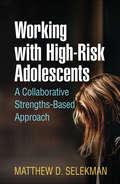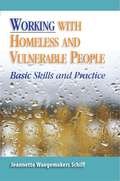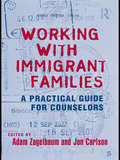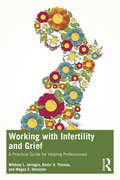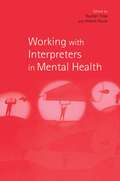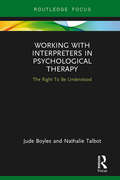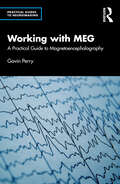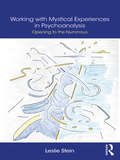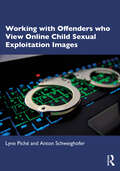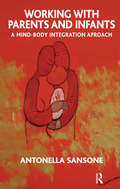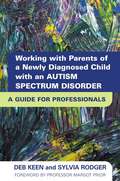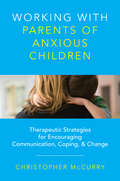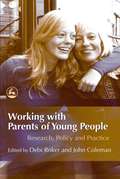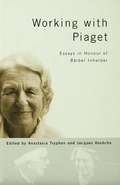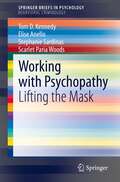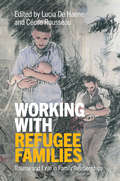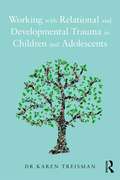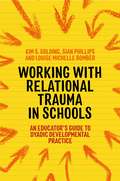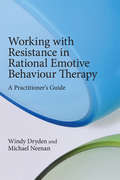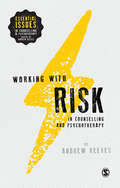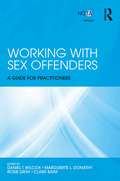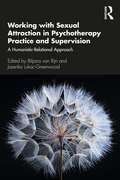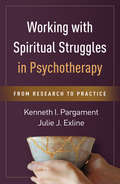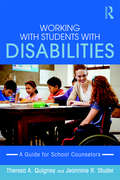- Table View
- List View
Working with High-Risk Adolescents: An Individualized Family Therapy Approach
by Matthew D. Selekman Harlene AndersonThis innovative book focuses on helping high-risk adolescents and their families rapidly resolve long-standing difficulties. Matthew D. Selekman spells out a range of solution-focused strategies and other techniques, illustrating their implementation with vivid case examples. His approach augments individual and family sessions with collaborative meetings that enlist the strengths of the adolescent's social network and key helping professionals from larger systems. User-friendly features include checklists, sample questions to aid in relationship building and goal setting, and reproducible forms that can be downloaded and printed in a convenient 8 1/2" x 11" size. Blending family therapy science with therapeutic artistry, the book significantly refines and updates the approach originally presented in Selekman's Pathways to Change.
Working with Homeless and Vulnerable People: Basic Skills and Practices
by Jeannette Waegemakers SchiffIt has long been established that access to food, clothing, medical care, and housing are fundamental human rights the world over. Helping the approximately 600,000 Americans and 300,000 Canadians who are currently homeless work toward this goal is a complex undertaking. This text presents the fundamental knowledge and skills that frontline workers need in order to help vulnerable and homeless persons. It provides readers with both an understanding of the lived experiences of those who have faced homelessness and an outline of the interprofessional practice context of services for homeless people. Waegemakers Schiff focuses on the interventions and best practices that have been found to be most effective in making connections, establishing helping relationships, and working with individuals on moving toward stabilization.
Working With Immigrant Families: A Practical Guide for Counselors (Routledge Series on Family Therapy and Counseling)
by Adam ZagelbaumThis book aims to create a foundation that respects theory, culture, and the mental health professions and to initiate the practical and needed discussions about how to work with immigrant families.
Working with Infertility and Grief: A Practical Guide for Helping Professionals
by Whitney L. Jarnagin Denis' A. Thomas Megan C. HerscherWorking with Infertility and Grief: A Practical Guide for Helping Professionals explores issues of grief, including disenfranchised grief and chronic sorrow, related to infertility and reproductive loss. Out of the small handful of books related to this topic, this is the first of its kind geared toward equipping helping professionals who assist those grieving unrecognized losses. Written through the lens of the literary framework of The Hero’s Journey, this comprehensive practitioner guide directly targets mental health professionals working with clients, supervisees, or students who have experienced infertility, miscarriage, or death of an infant. This book is also for those who experienced it themselves. Readers will learn more about the crisis of infertility and reproductive loss, gain insight into the experience of those suffering, and acquire practical tools and strategies for helping and healing. This text is broad enough to be integrated into a course for a graduate program and specific enough to serve as a shelf reference for those in practice.
Working with Interpreters in Mental Health
by Rachel Tribe Hitesh RavalWhy are interpreters an important part of modern healthcare provision?In today's society, there is an increasing need for mental health professionals to work with interpreters, yet coverage of this subject in the existing literature is scarce. Working with Interpreters in Mental Health gives an insight into the issues and problems of professionals working with interpreters in the mental health field.Informed by theoretical, research and practice considerations, Working with Interpreters in Mental Health helps practitioners to develop better ways of helping service users who need an interpreter. Combining contributions from a number of different disciplines, this book discusses:* interpreters in medical consultations* issues of language provision in health care services* the application of theoretical frameworks to the work with interpreters* the work of interpreters in a variety of practical settings.Whilst the focus the placed within a mental health context, many of the issues raised apply equally to other context where interpreters are needed. This book will be invaluable for practitioners of psychology, psychiatry, social work and other health professionals.
Working with Interpreters in Psychological Therapy: The Right To Be Understood (Routledge Focus on Mental Health)
by Jude Boyles Nathalie TalbotThis book is a practical and helpful guide for therapists that outlines best practice in working with interpreters. It provides an accessible tool for therapists working in a range of settings from small unfunded therapy teams in the voluntary sector to primary care work. Working with Interpreters in Psychological Therapy has been written collaboratively by a therapist and an interpreter working in the refugee sector. The writers reflect upon how therapists can manage some of the complex dynamics that can occur in the triadic relationship and explore how the presence of an interpreter can bring additional psychological benefits to clients. This book is essential reading for therapists working in cross-cultural settings, as well as the organizations in which they work.
Working with MEG (Practical Guides to Neuroimaging)
by Gavin PerryWorking with MEG provides an accessible, user-friendly guide to using magnetoencephalography (MEG) in neuroscience research. In this novel guide, Gavin Perry delves into the practical aspects of designing, running and analysing MEG studies – which have traditionally been transferred informally by lab support or word of mouth from more experienced researchers, a difficult and time-consuming task. This user-friendly guide provides those starting out in MEG research with these basics, giving them an understanding of concepts and terminology, guidance on using equipment, as well as an overview of the strengths and limitations of the technique. The book is packed with example figures and contains a glossary of key terms. Chapters in this book cover topics such as the physiological origins of the brain’s magnetic field, MEG instrumentation and how it can be used to measure brain activity, the process of collecting MEG data and how to design experimental paradigms for use with MEG. It also examines the fundamentals of MEG data analysis, including analysis in the time, frequency, and time–frequency domains; performing analysis of the sources of the MEG signals within the brain; and using statistical methods to perform hypothesis testing on MEG data, as well as examples of some of the most commonly used applications of MEG. Designed to be a practical guide for those new to the use of MEG as a research tool, this book will be essential reading for undergraduate, postgraduate and early career researchers looking for an introduction to MEG.
Working with Mystical Experiences in Psychoanalysis: Opening to the Numinous
by Leslie SteinA mystical experience, no matter what else, is a subjective occurrence in the psyche. However, when it appears in the psychoanalytic consulting room, its origin, content, and meaning are unknowable. Yet it is there in the room, and it must be addressed. It is not a minor illusion but rather one that requires attention as its occurrence may lead to a profound alteration of consciousness and, as Carl Jung suggests, a cure for neurosis. Leslie Stein interviewed twenty-nine mystics in order to understand the origin, progression, phasing, emotions, and individual variations of a mystical experience in order to make sense of how it should be addressed, the appropriate analytic attitude in the face of a mystery, the way to work with its content, and its psychological meaning. In doing so, he uncovered that there may be specific development markers that create a proclivity to be receptive to such an experience that has clinical significance for psychoanalysis.
Working with Offenders who View Online Child Sexual Exploitation Images
by Lyne Piché Anton SchweighoferThis comprehensive workbook addresses the use of illegal online sexual images. Focusing specifically on child sexual exploitation materials (CSEM), it offers a clear and professional manual for use with men who use CSEM. Working with clients who access illegal online images is challenging work. CSEM clients have unique characteristics and treatment needs. Designed around practitioner and client needs, each chapter provides a guide for clinicians and a subsequent set of materials for the client. The workbook covers a range of topics such as motivation for change, relationships, thinking patterns, emotions management, sexuality, computer use, Internet safety and future strategies to ensure both client and community safety. Addressing these issues as well as community accountability helps users of CSEM achieve a satisfying life while avoiding future criminal justice involvement. Through this clearly written and structured workbook, clients are given the resources to help manage problematic thoughts and/or illegal sexual behaviour. Offering evidence-based strategies rooted in the authors’ clinical experiences, the workbook enables the practitioner and client to work productively together to address the issues that have led to their involvement with illegal sexual images. This book will be helpful to a range of practitioners including forensic and clinical psychologists, as well as those working in correctional settings, such as probation and prison staff, psychiatrists, social workers, counsellors and providers of mental health treatment. It is also designed for anyone who has viewed, or is worried about viewing, sexual images of children.
Working with Parents and Infants: A Mind-Body Integration Approach
by Antonella SansoneWorking with Parents and Infants is aimed at understanding the process of psychosomatic illness, exploring the embodiment of psychosomatic health and illness, and the inseparability of psyche and soma. Within this book, the author highlights the beneficial function of psychosomatic symptoms, such as mastitis, in signalling to the counsellor or therapist as well as the patient the need for change and the path through which it may occur. Research and clinical literature have often overlooked the relationship between the woman's attitude to her bodyself, thus her mind-body integration, breastfeeding and the quality of interactions with her baby. A psychosomatic disturbance is in this book conceived as an impaired sense of bodyself, or in other words, a lack of psycho-soma integration. The author presents a new approach to health and the healing relationship emerging from a meeting between Eastern meditative disciplines and Western psychological practise.
Working with Parents of a Newly Diagnosed Child with an Autism Spectrum Disorder
by Sylvia Rodger Deb Keenxx
Working with Parents of Anxious Children: Therapeutic Strategies for Encouraging Communication, Coping & Change
by Christopher MccurryChanging the parent-child dynamic to improve anxiety symptoms. The topic of anxious children is on the front burner these days, both among parents and mental health professionals, and its only gaining attention as more and more clinicians are presented with anxious kids in their practices. Anxiety symptoms--whether panic, OCD, phobias, social or separation anxiety--are one of the primary reasons parents seek help from a mental health professional for their child. And yet, parents may unintentionally reward or encourage the problem through their own behavior (overprotection on the one hand, punishment on the other, or avoidance of all possible anxiety-provoking situations). This book will tackle that very issue, exploring the critical parent-child "dance" at the center of child development and uncovering how, with the proper knowledge and tools at hand, therapists can guide parents in changing their dynamic so anxious outbursts are reduced and a child's confidence and growth are better supported. A range of techniques that therapists can teach parents will be presented, including how to "change the choreography"--the parent-child dynamic--and how to work with "goodness of fit", or temperamental differences between a parent and a child. Parent management training and parent-child interaction training strategies will also be provided.
Working with Parents of Young People: Research, Policy and Practice
by Helen Richardson Foster Amanda Holt Louise Cox Debi Roker Cris Hoskin John Coleman Julie Shepherd Kerry Devitt Sarah Lindfield Nigel Sherriff Kevin Lowe Stephanie Stace Lester Coleman Helen Richardon FosterThis book provides practical guidance for a wide range of professionals working with parents and families, answering common questions such as 'How can parents facilitate their child's transition to secondary school?' and 'How can families best communicate about alcohol?'. Drawing on the findings from years of applied research projects carried out by the Trust for the Study of Adolescence, each chapter focuses on a particular area of parenting young people - from monitoring and supervision to support for foster families - and each highlights the implications of research results for policy and practice. This book presents a range of approaches to working with parents and families, and discusses the effectiveness of techniques such as parent mentoring and involving young people in parenting programmes. Working with Parents of Young People provides a strong set of evidence-based guidelines for best practice and will be a key resource for all those working to support the parents of teenagers.
Working with Piaget: Essays in Honour of Barbel Inhelder
by Anastasia Tryphon Jacques VonècheFor fifty years Bärbel Inhelder (1913-1997) was the research companion of Jean Piaget. In this unique volume, published in her honour, leading international researchers examine the various aspects of her work and ideas and her contribution to developmental psychology. Following an initial chapter establishing Inhelder's stature as an independent researcher in her own right, the various research topics that she explored are reviewed and discussed with specific reference to her own perspective and in the chronological order in which she approached them. While the book explores Inhelder's work with her more famous colleague, it also highlights areas of research in which her ideas were at variance with those of Piaget, such as mental imagery, and areas in which her innovations have not been fully recognised, such as her discovery of the formal operations stage - an event usually attributed to Piaget - and her introduction of longitudinal studies in the field of cognitive development. Her research, viewpoint and contribution in other fields such as mental retardation, learning, and cross-cultural issues in development are also discussed. The final chapter, written by Inhelder herself, deals with experimental reasoning in children and adolescents and provides a glimpse of her creativity.
Working with Psychopathy: Lifting the Mask (SpringerBriefs in Psychology)
by Tom D. Kennedy Elise Anello Stephanie Sardinas Scarlet Paria WoodsThis brief explores the research on psychopaths in various settings and in everyday life. Psychopaths are often predatory by nature but may appear normal to laypersons. Individuals working in health professions, forensic occupations, education and corporate environments are likely to encounter a person with psychopathic traits at some point in their respective careers; this brief highlights the value of being able to identify a person with psychopathic traits, to understand the implications, and to navigate any interactions. With recommendations for assessment and for guiding future interactions, this brief will be beneficial to mental health professionals, practitioners and researchers in psychology, forensic occupations, corrections, education, healthcare, and professionals in corporate environments.
Working with Refugee Families: Trauma and Exile in Family Relationships
by Lucia De Haene Cécile RousseauThe field of refugee family research and intervention forms a growing field of scientific study, focussing on the refugee family as the central niche of coping with, and giving meaning to, trauma, cultural uprooting, and exile. This important new book develops an understanding of the role of refugee family relationships in post-trauma healing and provides an in-depth analysis of central clinical-therapeutic themes in refugee family psychosocial interventions. Expert contributions from across transcultural psychiatry, psychology, psychotherapy and social work have provided chapters on post-trauma reconstruction in refugee family relationships, trauma care for refugee families, and intersectorial psychosocial interventions with refugee families. This exploration of refugee family systems in both research and clinical practice aims to promote a systemic perspective in health and social services working with families in refugee mental health care.
Working with Relational and Developmental Trauma in Children and Adolescents
by Karen TreismanWorking with Relational and Developmental Trauma in Children and Adolescents focuses on the multi-layered complex and dynamic area of trauma, loss and disrupted attachment on babies, children, adolescents and the systems around them. The book explores the impact of relational and developmental trauma and toxic stress on children’s bodies, brains, relationships, behaviours, cognitions, and emotions. The book draws on a range of theoretical perspectives through reflective exercises, rich case studies, practical applications and therapeutic strategies. With chapters on wider organisational and systemic dynamics, strength-based practices and the intergenerational transmission of relational trauma, Karen Treisman provides a holistic view of the pervasive nature and impact of working with trauma. Working with Relational and Developmental Trauma in Children and Adolescents will be of interest to professionals working with children and families in the community, in-patient, school, residential, and court-based settings, including clinical psychologists, psychiatrists, social workers, teachers, and students.
Working with Relational Trauma in Schools: An Educator's Guide to Using Dyadic Developmental Practice (Guides to Working with Relational Trauma Using DDP)
by Louise Michelle Bombèr Kim Golding Sian PhillipsWritten by experienced clinicians, this book provides an exploration of how educators can easily use Dyadic Developmental Practice (DDP) to help vulnerable pupils to thrive.DDP is an intervention model for children and young people who have experienced trauma in past relationships. Safety and security is increased through offering emotional connection in a variety of ways, helped by the attitude of PACE (playfulness, acceptance, curiosity and empathy). The model gives children the opportunity to experience the relationships necessary for healthy development, emotional regulation and resilience. This book gives educators all the tools they need to embed DDP into their practice, including building connections with students, partnerships with parents, understanding the theory behind DDP, and overcoming the challenges of implementing it in practice. These principles can be adapted to support pupils at all levels.
Working with Resistance in Rational Emotive Behaviour Therapy: A Practitioner's Guide
by Windy Dryden Michael NeenanProductive therapeutic change is facilitated when the therapist and client have a good therapeutic relationship, share views on salient therapeutic matters, agree on goals to enhance client well-being, and understand what they each have to do to achieve the goals of therapy. In this book Windy Dryden and Michael Neenan address the difficulties that both client and therapist bring to rational emotive behaviour therapy (REBT) when either party is resistant to change. Divided into two parts, Client Resistance and Therapist Resistance, Working with Resistance in Rational Emotive Behaviour Therapy tackles the challenges experienced by both client and clinician when using REBT. Addressing issues of resistance enables both the client and practitioner to move beyond problems in the consulting room and build a more productive relationship, resulting in more effective sessions and assisting in the resolution of underlying problems for which the client has sought help. Working with Resistance in Rational Emotive Behaviour Therapy is essential reading for any practitioner hoping to use REBT more effectively in their day-to-day practice.
Working with Risk in Counselling and Psychotherapy (Essential Issues in Counselling and Psychotherapy - Andrew Reeves)
by Dr Andrew ReevesThe wide-ranging contexts in which counselling and psychotherapy is now practiced means clients present with a range of risks that therapists have to respond to. Risk is an ever-present issue for counsellors and psychotherapists and, in an increasingly litigious culture, the need for trainees to develop a sound understanding of how the right tools and the right knowledge can support their practice has never been greater. In this book Andrew Reeves takes trainees, newly qualified practitioners, and more experienced practitioners step-by-step through what is meant by risk, offering practical hints and tips and links to policy and research to inform good ethical practice along the way. This book tackles: • The definition of risk and how risk is linked to social, psychological and relational factors • Working with those who are at risk of suicide, self-injury, self-harm and/or are an endangerment to others • How therapists should respond to the risk in situations involving child protection, mental health crises, and in the therapeutic process itself • The positive side of risk-taking • How counsellors and psychotherapists can work with risk proactively and positively, informed by research. Filled with case studies, ethical dilemmas, reflective questions, discussion questions and further reading, this book offers counsellors and psychotherapists guidance on how they can work with risk proactively and positively. It is an essential resource for all services, organisations and individual practitioners.
Working with Risk in Counselling and Psychotherapy (Essential Issues in Counselling and Psychotherapy - Andrew Reeves)
by Dr Andrew ReevesThe wide-ranging contexts in which counselling and psychotherapy is now practiced means clients present with a range of risks that therapists have to respond to. Risk is an ever-present issue for counsellors and psychotherapists and, in an increasingly litigious culture, the need for trainees to develop a sound understanding of how the right tools and the right knowledge can support their practice has never been greater. In this book Andrew Reeves takes trainees, newly qualified practitioners, and more experienced practitioners step-by-step through what is meant by risk, offering practical hints and tips and links to policy and research to inform good ethical practice along the way. This book tackles: * The definition of risk and how risk is linked to social, psychological and relational factors * Working with those who are at risk of suicide, self-injury, self-harm and/or are an endangerment to others * How therapists should respond to the risk in situations involving child protection, mental health crises, and in the therapeutic process itself * The positive side of risk-taking * How counsellors and psychotherapists can work with risk proactively and positively, informed by research. Filled with case studies, ethical dilemmas, reflective questions, discussion questions and further reading, this book offers counsellors and psychotherapists guidance on how they can work with risk proactively and positively. It is an essential resource for all services, organisations and individual practitioners.
Working with Sex Offenders: A Guide for Practitioners
by Daniel Wilcox Marguerite Donathy Rosie Gray Clark BaimWorking with Sex Offenders is a unique book which brings together leading practitioners in the field to provide a comprehensive and up-to-date distillation of relevant guidance to assist anyone who works with sex offenders. The authors examine topics including assessment, treatment, supervision and safeguarding. Skills and strategies for successful engagement with offenders are a key focus of the book, as well as improving understanding of underpinning factors associated with offending and desistance. This volume, which is derived from well-received presentations hosted by the UK’s National Organisation for the Treatment of Abusers (NOTA) over a number of years, also offers a detailed examination of individual, organisational and societal roles in relation to identifying and preventing sexual abuse in our communities. Using case examples throughout, Working with Sex Offenders will be essential reading for all professionals involved in the management and treatment of sex offenders.
Working with Sexual Attraction in Psychotherapy Practice and Supervision: A Humanistic-Relational Approach
by Biljana Van RijnWorking with Sexual Attraction in Psychotherapy Practice and Supervision addresses some of the challenges associated with sexual attraction in psychotherapy practice and supervision, as well as within services, and helps therapists, supervisors, and managers to navigate them with openness and self-reflection. The book focuses on practical and applied issues, using a relational humanistic-integrative theoretical approach as a backdrop for understanding. Split into three parts, it deals with issues related to clinical practice, supervision and ethical issues. Chapters support in-depth exploration in all three arenas of practice and are completed by editors providing a reflective summary. Enriched with case examples and research written by senior relational practitioners, the book will be beneficial to therapists, supervisors, and service managers in the field of psychotherapy.
Working with Spiritual Struggles in Psychotherapy: From Research to Practice
by Kenneth I. Pargament Julie J. ExlineDoes my life have any deeper meaning? Does God really care about me? How can I find and follow my moral compass? What do I do when my faith is shaken to the core? Spiritual trials, doubts, or conflicts are often intertwined with mental health concerns, yet many psychotherapists feel ill equipped to discuss questions of faith. From pioneers in the psychology of religion and spirituality, this book combines state-of-the-art research, clinical insights, and vivid case illustrations. It guides clinicians to understand spiritual struggles as critical crossroads in life that can lead to brokenness and decline--or to greater wholeness and growth. Clinicians learn sensitive, culturally responsive ways to assess different types of spiritual struggles and help clients use them as springboards to change.
Working with Students with Disabilities: A Guide for Professional School Counselors
by Jeannine R. Studer Theresa A. QuigneyLike no other book available, Working with Students with Disabilities: A Guide for School Counselors provides comprehensive coverage of school counselors’ roles in special education and working with students with disabilities and connects that coverage to both the ASCA national model and CACREP standards. In Working with Students with Disabilities, school counselors will find thoughtful analyses of the legal and regulatory basis for many of the practices in special education, including an overview of pertinent laws including the Individuals with Disabilities Education Improvement Act and Section 504 of the Rehabilitation Act. They’ll gain an in-depth understanding of the leadership role that school counselors should play in supporting students, teachers, and families, and they’ll also come away with an understanding of the common challenges—like bullying, cyberbullying, and successful transitioning from high school to adult life— to which students with disabilities may be more vulnerable, as well as less common challenges such as behavioral difficulties, autism spectrum disorders, and many more.
